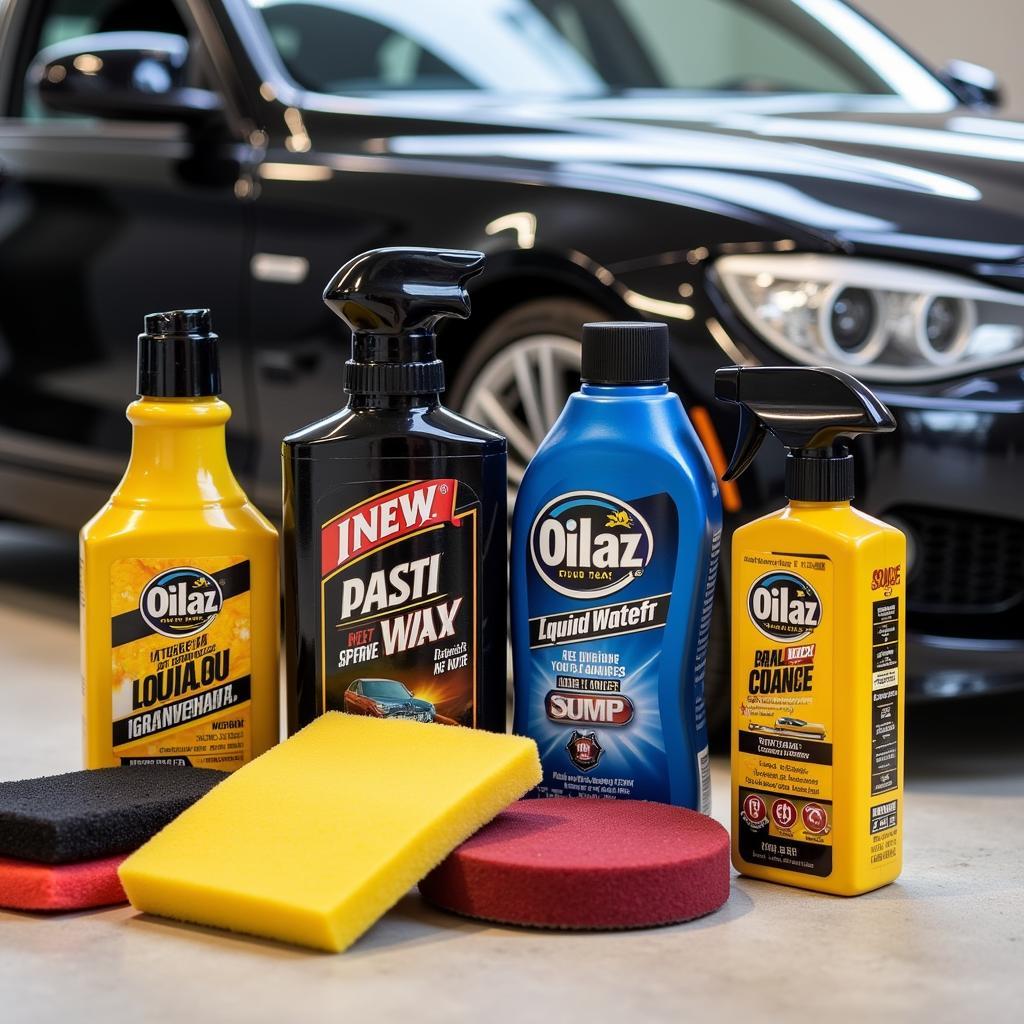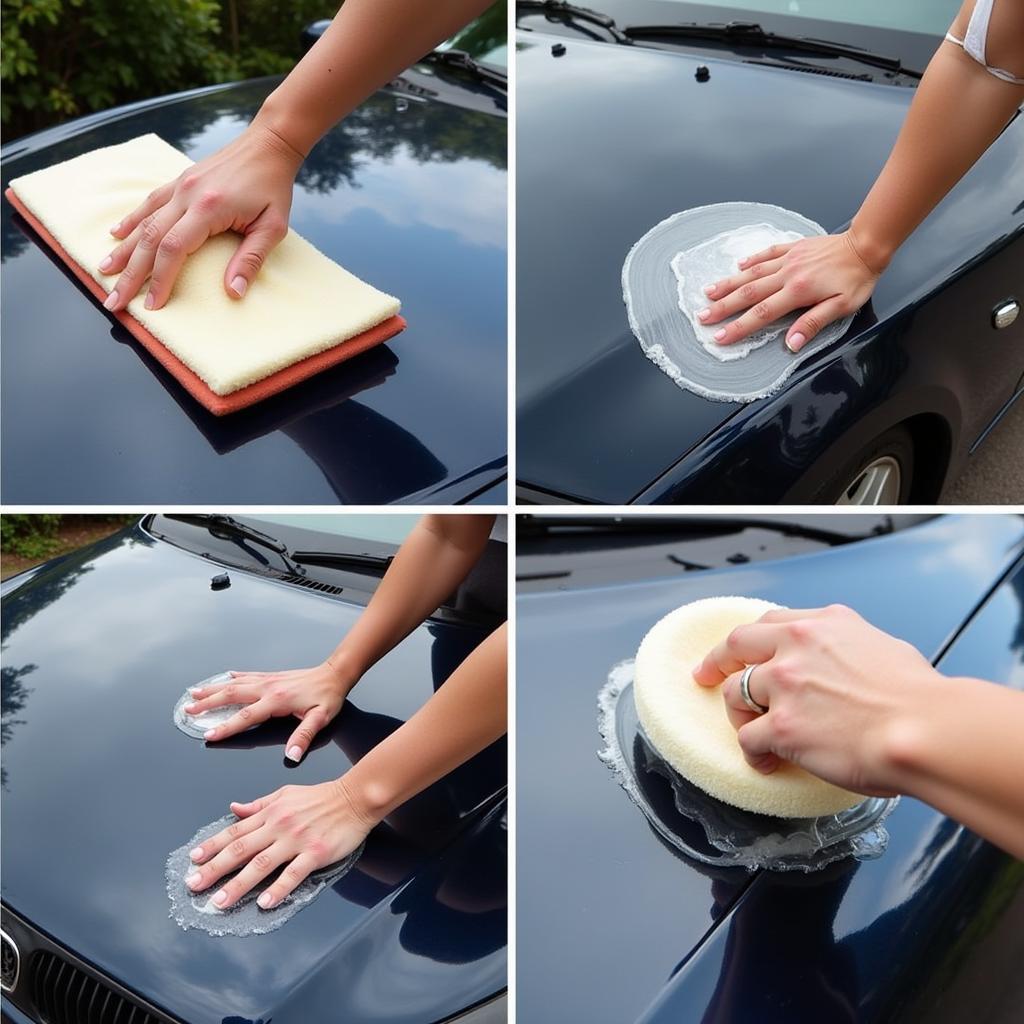Waxing is an essential part of car detailing that protects your car’s paint and keeps it looking its best. But with so many different types of wax available, it can be tough to know when your car needs a fresh coat. This comprehensive guide will explore the different types of car wax and when to apply them, ensuring your vehicle always has the ultimate protection and shine.
 Different types of car wax and their application
Different types of car wax and their application
Understanding the Different Types of Car Wax
Before we dive into when your car needs wax, let’s clarify the different types available:
-
Carnauba Wax: Derived from palm leaves, carnauba wax is a natural wax known for its deep, glossy shine and durable protection. It forms a hard shell that shields against UV rays, water spots, and minor scratches.
-
Synthetic Wax: Also known as sealants, synthetic waxes are formulated with polymers that bond to the paint, creating a long-lasting barrier against environmental contaminants. They offer excellent protection and are generally easier to apply than carnauba wax.
-
Ceramic Coatings: A more advanced option, ceramic coatings utilize nanotechnology to create a semi-permanent layer of protection on your car’s paint. These coatings provide superior durability, hydrophobicity (water repellency), and scratch resistance compared to traditional waxes.
Signs Your Car Needs Waxing
-
Water Beading (or Lack Thereof): One of the easiest ways to tell if your car needs waxing is to observe how water behaves on the surface. If water beads up into small, tight droplets, your wax is still doing its job. However, if water sheets across the paint or forms large, flat droplets, it’s time for a fresh coat.
-
Faded Paint and Reduced Shine: Wax acts like sunscreen for your car’s paint, protecting it from harmful UV rays. If you notice your car’s paint looking dull or faded, it could indicate the wax has worn off, leaving the paint vulnerable to damage.
-
Rough Texture: Run your hand gently over the clean surface of your car. If it feels rough or gritty, contaminants may have accumulated on the paint, hindering the wax’s ability to protect and shine.
-
Visible Swirls and Scratches: While wax can’t magically erase deep scratches, a well-maintained wax layer can minimize the appearance of light swirl marks and minor scratches by filling in microscopic imperfections.
When to Apply Different Types of Wax
-
New Car: Most new cars come with a layer of factory-applied sealant. However, this protection doesn’t last forever. Applying a coat of synthetic wax or a ceramic coating within the first year can enhance the existing protection and keep your new car looking pristine.
-
Regular Maintenance: For cars with existing paint protection, a regular waxing schedule is crucial for optimal results. Apply a carnauba wax or synthetic sealant every 3-6 months, depending on the product and your driving conditions.
-
Show Car Preparation: Car enthusiasts aiming for the ultimate shine and protection for car shows or special occasions often opt for multiple layers of carnauba wax. This meticulous process enhances the depth and warmth of the paint, creating a mirror-like finish.
-
Long-Term Protection: If you’re seeking long-lasting protection and reduced maintenance, a ceramic coating is the way to go. These coatings can last for several years with proper care, providing superior defense against environmental hazards and maintaining a high-gloss finish.
 Applying car wax to a vehicle’s exterior
Applying car wax to a vehicle’s exterior
Factors Influencing Waxing Frequency
Several factors can influence how often you need to wax your car:
-
Climate and Weather Conditions: Cars exposed to harsh weather, extreme temperatures, UV radiation, and salt air will require more frequent waxing than those driven in milder climates.
-
Driving Habits: Frequent driving, especially on dirt roads or in areas with high pollution levels, will contribute to faster wax deterioration.
-
Car Wash Routine: Using harsh car wash detergents or abrasive washing techniques can strip away wax protection more quickly. Opt for pH-neutral car wash soaps and gentle washing methods to preserve the wax layer.
Expert Insights
“Investing in quality car wax and adhering to a regular waxing schedule is crucial for protecting your car’s paint and preserving its resale value,” says automotive detailing specialist Mark Williams. “Remember, prevention is key. Regular waxing not only enhances your car’s appearance but also acts as a sacrificial barrier, protecting the paint from harmful elements.”
Conclusion
Waxing is an essential aspect of car care that not only enhances your vehicle’s aesthetics but also provides vital protection for its paintwork. By understanding the different types of wax available and recognizing the signs that your car needs a fresh coat, you can keep your vehicle looking its best for years to come. Remember to choose the right type of wax based on your needs and maintain a regular waxing schedule to maximize protection and shine.
FAQs
1. Can I wax my car myself, or should I take it to a professional detailer?
Waxing your car can be a DIY project, but it requires proper technique and quality products for optimal results. If you’re unsure about the process, seeking professional detailing services ensures a flawless finish.
2. How long does it take for car wax to dry?
Drying times vary depending on the type of wax, temperature, and humidity. Generally, allow car wax to haze over before buffing off with a microfiber cloth.
3. Can I apply wax over existing scratches?
While wax can minimize the appearance of minor scratches, it won’t repair deep paint damage. For significant scratches, consider paint correction techniques before waxing.
4. What happens if I don’t wax my car regularly?
Neglecting regular waxing can lead to paint fading, oxidation, water spots, and a higher susceptibility to scratches and swirl marks.
5. How do I remove old car wax before applying a new coat?
Wash your car thoroughly with a pH-neutral car wash soap. If necessary, use a clay bar to remove stubborn contaminants before applying a fresh coat of wax.
Need More Information?
For further guidance on car detailing and specific product recommendations tailored to your vehicle, explore our other informative articles on CarDetailingUK or contact our expert team through WhatsApp: +1(641)206-8880, Email: [email protected]. We’re available 24/7 to assist you.

Leave a Reply